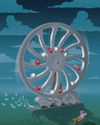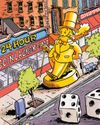Tamara Mellon is most famous for cofounding Jimmy Choo. But in 2013, she started building a new brand…named after herself. It’s been bumpy. (She went bankrupt.) But she’s finally become the entrepreneur she always wanted to be.

Tamara Mellon just wanted to move on.
For most of her career, she’d been defined by one brand: Jimmy Choo. She cofounded the luxury footwear company in 1996, and it quickly became the final word on playful, sexy shoes for women. She grew the business for 15 years until her relationship with the company soured, leaving Mellon feeling overlooked, overworked, and under-compensated. She left in 2011.
Two years later, in 2013, she was ready to launch a new shoe brand. Everything about it would be different. (For starters, she’d name it after herself.) While the rest of the industry releases one large collection each season, she’d release products monthly. Women, she realized, no longer wanted to see autumn clothing on a runway in February, wait until August to buy it, then wait until it gets cold to wear it. “I was thinking about the next generation of luxury,” she says.
At first, the industry was intrigued. Investors put in $24 million. Retailers set up meetings. But she hit a wall. She kept hearing the same feedback: She was trying to do things too differently. The timing wouldn’t work, people told her. Monthly shipments would be impossible to manage. “I had three investors who wanted me to just go back to fashion’s old calendar and build Tamara Mellon the same way I’d built Jimmy Choo,” she says.
It was a crossroads. She could do things the way they’d always been done, or she could blaze her own path, despite the discomfort that was sure to follow.
She chose her own path. “And that,” she says, “is how I ended up in Chapter 11.”
But it would be worth it.
Denne historien er fra July - August 2019-utgaven av Entrepreneur.
Start din 7-dagers gratis prøveperiode på Magzter GOLD for å få tilgang til tusenvis av utvalgte premiumhistorier og 9000+ magasiner og aviser.
Allerede abonnent ? Logg på
Denne historien er fra July - August 2019-utgaven av Entrepreneur.
Start din 7-dagers gratis prøveperiode på Magzter GOLD for å få tilgang til tusenvis av utvalgte premiumhistorier og 9000+ magasiner og aviser.
Allerede abonnent? Logg på

How to Succeed With Gen Z Workers
People often say that younger employees are different. But are they? We asked six business leaders what they've learned, and how their teams thrive.

There's No Perfect Answer
I worked the same job for 19 years. I hated it, but it paid the bills. Then, in 2017, I entertained an exciting but terrifying question: Could I be an entrepreneur? I wasn't sure, so I needed something that felt like a guarantee. I searched for signs that would feel like a big, clear \"yes!\" Instead, what I found was a tarot card deck.

10 HOTTEST TRENDS for 2025
Want to buy a brand that buzzes? Here's what to know.

BUILD YOUR MONEY MACHINE
A franchise isn't just a franchise. It should be a Money Machine, creating profit even while you're out of the office. Here's how.

The Top Franchises for Veterans
Are you a military vet looking to become a franchisee, or just want to support a brand that supports the troops? Check out these 150 brands.

20 LEADERS WHO ARE DEFINING ENTREPRENEURSHIP TODAY
In a year of disruption, we wanted to know: Whose work will define the years to come? We reviewed hundreds of names and picked 20 leaders across a range of industries and sizes. Meet them on the following pages, and see what it takes to thrive in 2025 and beyond.

How to Become a Main Street Millionaire
It started when I bought one little laundromat. Now I have a whole portfolio of small local businesses that bring in tens of millions in revenue a year. Here's why following my playbook could be your ticket to financial freedom-and saving America's local small businesses.

Want to Better Serve Your Clients? Become Them.
As a designer for brands, starting my own product company gave me a dose of humilityand it changed the way I relate to clients.

I've Been a Publicist for 17 Years.Don't Hire Me.
Entrepreneurs often think they need PR. Most don't. Here's why you're probably better off not hiring someone like me.

The CEO's Advice to the MVP
Kickstarter CEO Everette Taylor knows the formula for a successful launch. NBA champ Jaylen Brown recently launched a shoe and athleisure brand. They have a lot to teach each other.